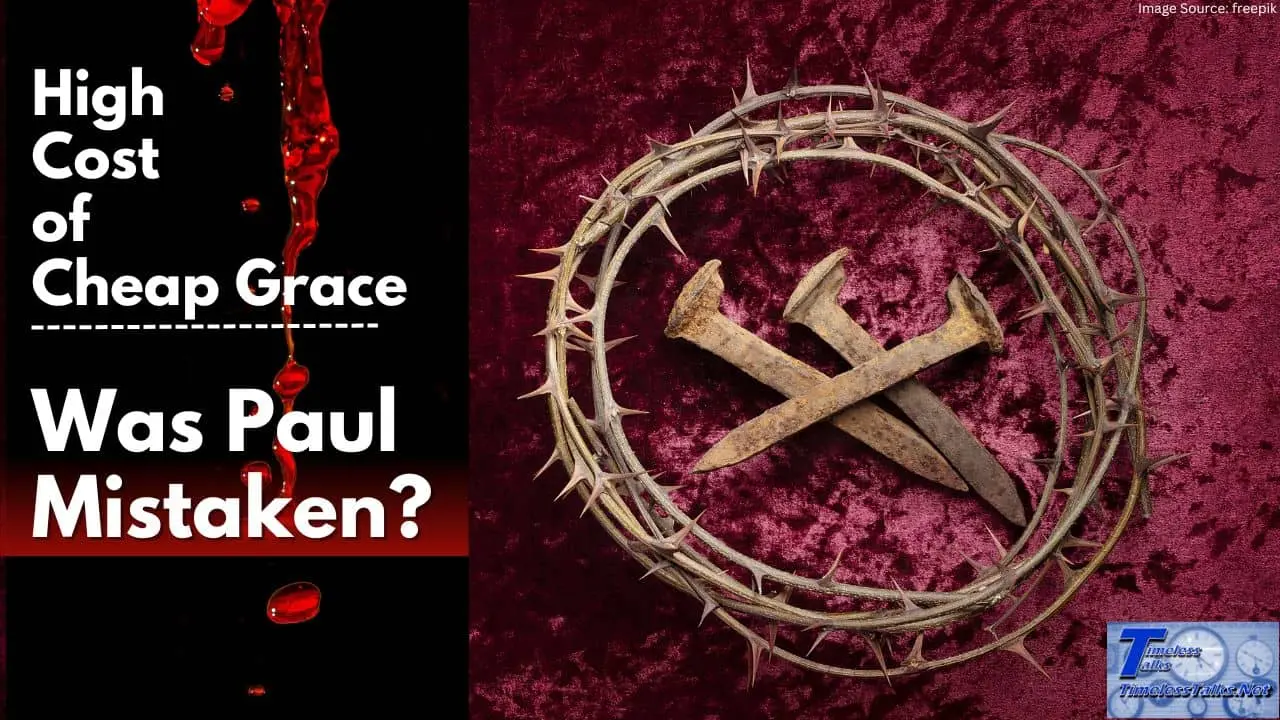High Cost of Cheap Grace:
Was Paul Mistaken?
Written by John Ratliff
You can:
- DOWNLOAD offline on your computer/tablet/phone as a PDF file and read it anytime, OR
- Use the CONTACT LINK above (under Services) to request your collection be sent to you via USPS. This will REQUIRE you to include your mailing address (U.S. only).
The High Cost of Cheap Grace: Was Paul Mistaken?
Was the apostle Paul mistaken?Did he not know that Jesus did everything and there was nothing he needed to do to be saved?
What does “not of works, lest anyone should boast” (Eph. 2:9) mean?
INTRO
Did Paul contradict his other statements?
Did the Holy Spirit tell Paul one thing and James another (“a man is justified by works, and not by faith only,”—James 2:24)
NO!!
Two different kinds of works are under consideration. Works of merit differ from works of obedience. It is one thing to try to get to heaven by doing good works; it is another to humbly submit to God’s commands.
We appropriate God’s grace by meeting the conditions He attaches to it.
Do we earn it?—No
Do we deserve it?—No
He gives it away.
But He only gives it to those who respect His will enough to do what He asks of them—John 14:15; 15:14. Jesus is “the author of eternal salvation to all who obey Him…”—Hebrews 5:9.
In Paul’s letter to the Romans, he declared that “the gift of God is eternal life in Christ Jesus our Lord.”—Romans 6:23.
In similar fashion, Paul wrote, “For by grace you have been saved…it is the gift of God.”—Eph. 2:8.
Many read these words and focus on the term “gift,” and conclude that redemption must be wholly dependent on God, and that man is without responsibility in his salvation.
What is failed to be realized is that a “gift” can be conditional, without there being any meritorious effort by the recipient.
Folks, we cheapen the grace of God when we remove our responsibility from the equation.
When Paul was traveling to Rome, it came to the point where it seemed that he, along with those with him were in jeopardy of losing their lives. Yet, Paul was encouraged by an angel who told him “Do not be afraid, Paul; you must be brought before Caesar; and indeed God has granted (given) you all those who sail with you.’”—Acts 27:24. However, this gift was not unconditional; thus, Paul warned the centurion and soldiers, “Unless these men stay in the ship, you cannot be saved.”—Acts 27:31.
Salvation is God’s gift, “Unless one is born again, he cannot see the kingdom of God.”—John 3:5.
Obedience is essential to salvation and necessary to receive God’s grace.
Obeying God is not an attempt to earn salvation, it is obedience—Luke 17:10.
CONCLUSION
God’s forgiveness is not automatic; we can reject His grace and salvation. You and I (WE) must accept God’s pardon, and we must accept it on His terms.
The wonderful grace of God came at a HIGH COST. Let us not cheapen it by our lack of understanding or removing our responsibility.
Grace and truth came through Jesus (John 1:17). Jesus taught that one must hear His word (John 6:44-45); believe in Him (John 3:16; 8:24); repent of sins (Luke 13:3, 5), confess faith in Him (Matthew 10:32, 33), and be baptized for forgiveness of sins (Mark 16:16).
To reject the clear teachings of Jesus is to cheapen the grace of God by which you are saved—Ephesians 2:8-9.
If you have never believed, trusted, and obeyed Jesus, don’t wait. The invitation is yours—“What will your answer be?”
We will help you.
Call us or text us at the number on the screen. We will contact you shortly.
Use the contact page, under services above, to send us an email.
Or you can use the prayer request page.
We love you.
Thanks for watching. We look forward to you watching more videos, tomorrow. Bye for now.

